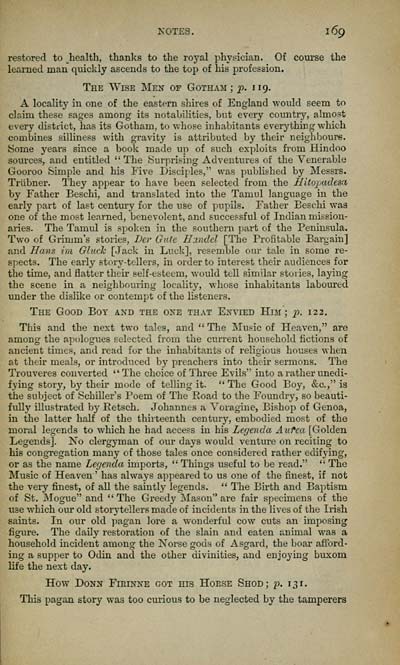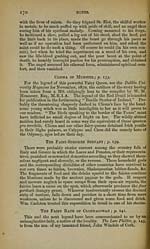Download files
Complete book:
Individual page:
Thumbnail gallery: Grid view | List view

NOTES. 169
restored to health, thanks to the royal phy:?ician. Of course the
learned man quickly ascends to the top of his profession.
The Wise Men of Gotham; p. 119.
A locality in one of the eastern shires of England would seem to
claim these sages among its notabilities, but every country, almost
every district, has its Gotham, to whose inhabitants everything which
combines silliness with gravity is attributed by their neighbours.
Some years since a book made up of such exploits from Hindoo
sources, and entitled " The (Surprising Adventures of the A-^enerable
Gooroo Simple and his Five Disciples," was published by Messrs.
Triibner. They appear to have been selected from the Hitopadesa
by Father Beschi, and translated into the Tamul language in the
early part of last century for the use of pupils. Father Beschi was
one of the most learned, benevolent, and successful of Indian mission-
ai-ies. The Tamul is spoken in the southern part of the Peninsula.
Two of Grimm's stories, Lev Gufe Handel [The Profitable Bargain]
and Hans im Gluch [Jack in Luck], resemble our tale in some re-
spects. The early story-tellers, in order to interest their audiences for
the time, and flatter their self-esteem, would tell similar stories, laying
the scene in a neighbouring locality, whose inhabitants laboured
under the dislilie or contempt of the listeners.
The Good Boy and the one that EN\^ED Him ; p. 122.
This and the next two tales, and " The Music of Heaven," are
among the apologues selected from the current household fictions of
ancient times, and read for the inhabitants of religious houses when
at their meals, or introduced by preachers into their sermons. The
Trouveres converted "The choice of Three Evils" into a rather unedi-
fying story, by their mode of telling it. " The Good Boy, &c.," is
the subject of Schiller's Poem of The Road to the Foundry, so beauti-
fully illustrated by Eetsch. Johannes a A'oragine, Bishoj) of Genoa,
in the latter half of the thirteenth century, embodied most of the
moral legends to which he had access in his Legenda Aufea [Golden
Legends]. No clergyman of our days would venture on reciting to
his congregation many of those tales once considered rather edifying,
or as the name Legenda imports, " Things useful to be read." " The
Music of Heaven ' has always appeared to us one of the finest, if not
the very finest, of all the saintly legends. " The Birth and Baptism
of St. Mogue" and " The Greedy Mason" are fair specimens of the
use which our old storytellers made of incidents in the lives of the Irish
saints. In our old pagan lore a wonderful cow cuts an imposing
figure. The daUy restoration of the slain and eaten animal was a
household incident among the Norse gods of Asgard, the boar afford-
ing a supper to Odin and the other divinities, and enjoying buxom
life the next day.
How DoNN Fieinne got his Hoese Shod; p. 131.
This pagan story was too curious to be neglected by the tamperers
restored to health, thanks to the royal phy:?ician. Of course the
learned man quickly ascends to the top of his profession.
The Wise Men of Gotham; p. 119.
A locality in one of the eastern shires of England would seem to
claim these sages among its notabilities, but every country, almost
every district, has its Gotham, to whose inhabitants everything which
combines silliness with gravity is attributed by their neighbours.
Some years since a book made up of such exploits from Hindoo
sources, and entitled " The (Surprising Adventures of the A-^enerable
Gooroo Simple and his Five Disciples," was published by Messrs.
Triibner. They appear to have been selected from the Hitopadesa
by Father Beschi, and translated into the Tamul language in the
early part of last century for the use of pupils. Father Beschi was
one of the most learned, benevolent, and successful of Indian mission-
ai-ies. The Tamul is spoken in the southern part of the Peninsula.
Two of Grimm's stories, Lev Gufe Handel [The Profitable Bargain]
and Hans im Gluch [Jack in Luck], resemble our tale in some re-
spects. The early story-tellers, in order to interest their audiences for
the time, and flatter their self-esteem, would tell similar stories, laying
the scene in a neighbouring locality, whose inhabitants laboured
under the dislilie or contempt of the listeners.
The Good Boy and the one that EN\^ED Him ; p. 122.
This and the next two tales, and " The Music of Heaven," are
among the apologues selected from the current household fictions of
ancient times, and read for the inhabitants of religious houses when
at their meals, or introduced by preachers into their sermons. The
Trouveres converted "The choice of Three Evils" into a rather unedi-
fying story, by their mode of telling it. " The Good Boy, &c.," is
the subject of Schiller's Poem of The Road to the Foundry, so beauti-
fully illustrated by Eetsch. Johannes a A'oragine, Bishoj) of Genoa,
in the latter half of the thirteenth century, embodied most of the
moral legends to which he had access in his Legenda Aufea [Golden
Legends]. No clergyman of our days would venture on reciting to
his congregation many of those tales once considered rather edifying,
or as the name Legenda imports, " Things useful to be read." " The
Music of Heaven ' has always appeared to us one of the finest, if not
the very finest, of all the saintly legends. " The Birth and Baptism
of St. Mogue" and " The Greedy Mason" are fair specimens of the
use which our old storytellers made of incidents in the lives of the Irish
saints. In our old pagan lore a wonderful cow cuts an imposing
figure. The daUy restoration of the slain and eaten animal was a
household incident among the Norse gods of Asgard, the boar afford-
ing a supper to Odin and the other divinities, and enjoying buxom
life the next day.
How DoNN Fieinne got his Hoese Shod; p. 131.
This pagan story was too curious to be neglected by the tamperers
Set display mode to: Large image | Transcription
Images and transcriptions on this page, including medium image downloads, may be used under the Creative Commons Attribution 4.0 International Licence unless otherwise stated. ![]()
| Early Gaelic Book Collections > J. F. Campbell Collection > Fireside stories of Ireland > (187) |
|---|
| Permanent URL | https://digital.nls.uk/79185304 |
|---|
| Description | Volumes from a collection of 610 books rich in Highland folklore, Ossianic literature and other Celtic subjects. Many of the books annotated by John Francis Campbell of Islay, who assembled the collection. |
|---|
| Description | Selected items from five 'Special and Named Printed Collections'. Includes books in Gaelic and other Celtic languages, works about the Gaels, their languages, literature, culture and history. |
|---|

